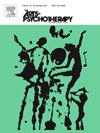A single-arm pilot study to assess salivary metabolites in facilitators tested with Pre-Texts arts-literacy intervention
IF 1.5
3区 心理学
Q3 PSYCHOLOGY, CLINICAL
引用次数: 0
Abstract
The Pre-Texts arts-literacy intervention has demonstrated effectiveness for reducing depression and anxiety symptoms in adolescents. However, the biological mechanisms underlying these psychological changes remain largely unexplored. This single-arm pilot study investigated the impact of Pre-Texts training on salivary metabolite profiles in adults (N = 10) undergoing facilitator training. Participants completed a 20-hour Pre-Texts program over four days, with saliva samples collected at baseline, during training (day 3), immediately post-intervention (day 4), and at 8-week follow-up. Flow injection analysis-tandem mass spectrometry quantified seven key metabolites linked to glutamate signaling (glutamic acid, glycine, valine, proline) and cellular metabolism/energy production (alanine, citrulline, C3 propionylcarnitine). Results demonstrated significant and sustained increases in glutamic acid, glycine, valine, proline, alanine, and citrulline, with concurrent decreases in C3 propionylcarnitine, versus baseline. These neurobiochemical changes were still present at follow-up, indicating the possibility of sustained effects on neurotransmission and cellular energetics. The observed metabolic shifts may reflect mechanisms involving NMDA receptor activation, neuroplasticity, cognitive flexibility, and stress response regulation. This preliminary investigation establishes methodological foundations for an expanded research examining the biological mechanisms underlying arts-based interventions, suggesting that Pre-Texts may foster neurometabolic changes that may be supportive of cognitive and emotional wellbeing.
一项单臂试点研究,评估在Pre-Texts艺术素养干预测试促进者的唾液代谢物
Pre-Texts arts-literacy干预已被证明对减少青少年抑郁和焦虑症状有效。然而,这些心理变化背后的生物学机制在很大程度上仍未被探索。这项单臂先导研究调查了Pre-Texts训练对接受辅助训练的成人(N = 10)唾液代谢物谱的影响。参与者在4天内完成了20小时的文本前课程,在基线、训练期间(第3天)、干预后立即(第4天)和8周的随访中收集唾液样本。流动注射分析-串联质谱法定量了与谷氨酸信号(谷氨酸、甘氨酸、缬氨酸、脯氨酸)和细胞代谢/能量产生(丙氨酸、瓜氨酸、C3丙酰肉碱)相关的7种关键代谢物。结果显示,与基线相比,谷氨酸、甘氨酸、缬氨酸、脯氨酸、丙氨酸和瓜氨酸显著且持续增加,同时C3丙酰肉碱降低。这些神经生化变化在随访时仍然存在,表明可能对神经传递和细胞能量学产生持续影响。观察到的代谢变化可能反映了NMDA受体激活、神经可塑性、认知灵活性和应激反应调节等机制。这项初步调查为进一步研究以艺术为基础的干预措施的生物学机制奠定了方法论基础,表明Pre-Texts可能促进神经代谢变化,从而支持认知和情感健康。
本文章由计算机程序翻译,如有差异,请以英文原文为准。
求助全文
约1分钟内获得全文
求助全文
来源期刊

Arts in Psychotherapy
Multiple-
CiteScore
3.20
自引率
11.10%
发文量
66
期刊介绍:
The Arts in Psychotherapy is a dynamic, contemporary journal publishing evidence-based research, expert opinion, theoretical positions, and case material on a wide range of topics intersecting the fields of mental health and creative arts therapies. It is an international peer-reviewed journal publishing 5 issues annually. Papers are welcomed from researchers and practitioners in the fields of art, dance/movement, drama, music, and poetry psychotherapy, as well as expressive and creative arts therapy, neuroscience, psychiatry, education, allied health, and psychology that aim to engage high level theoretical concepts with the rigor of professional practice. The journal welcomes contributions that present new and emergent knowledge about the role of the arts in healthcare, and engage a critical discourse relevant to an international readership that can inform the development of new services and the refinement of existing policies and practices. There is no restriction on research methods and review papers are welcome. From time to time the journal publishes special issues on topics warranting a distinctive focus relevant to the stated goals and scope of the publication.
 求助内容:
求助内容: 应助结果提醒方式:
应助结果提醒方式:


